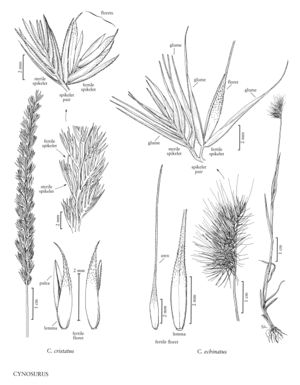Difference between revisions of "Cynosurus echinatus"
FNA>Volume Importer |
FNA>Volume Importer |
||
| Line 17: | Line 17: | ||
-->{{Treatment/Body | -->{{Treatment/Body | ||
|distribution=Wash.;B.C.;W.Va.;N.J.;N.Mex.;Tex.;La.;N.C.;S.C.;Tenn.;N.Y.;Pa.;Va.;Calif.;Ala.;Ark.;Ga.;Conn.;Md.;Okla.;Ohio;Mo.;Mich.;Mont.;Miss.;Oreg. | |distribution=Wash.;B.C.;W.Va.;N.J.;N.Mex.;Tex.;La.;N.C.;S.C.;Tenn.;N.Y.;Pa.;Va.;Calif.;Ala.;Ark.;Ga.;Conn.;Md.;Okla.;Ohio;Mo.;Mich.;Mont.;Miss.;Oreg. | ||
| − | |discussion=<p>Cynosurus echinatus is native to southern Europe. It is now established in dry, open habitats in North America, South America, and Australia.</p> | + | |discussion=<p><i>Cynosurus echinatus</i> is native to southern Europe. It is now established in dry, open habitats in North America, South America, and Australia.</p> |
|tables= | |tables= | ||
|references= | |references= | ||
| Line 38: | Line 38: | ||
|publication year= | |publication year= | ||
|special status= | |special status= | ||
| − | |source xml=https://jpend@bitbucket.org/aafc-mbb/fna-data-curation.git/src/ | + | |source xml=https://jpend@bitbucket.org/aafc-mbb/fna-data-curation.git/src/8f726806613d60c220dc4493de13607dd3150896/coarse_grained_fna_xml/V24/V24_970.xml |
|subfamily=Poaceae subfam. Pooideae | |subfamily=Poaceae subfam. Pooideae | ||
|tribe=Poaceae tribe Poeae | |tribe=Poaceae tribe Poeae | ||
Revision as of 16:23, 18 September 2019
Plants annual; tufted. Culms 9-70 cm, clustered or solitary. Sheaths smooth, glabrous; ligules 2.5-5(10) mm, obtuse, entire; blades 3-13.5(23) cm long, 2.5-14 mm wide, scab¬rous. Panicles 1-4(8) cm long, 0.7-2 cm wide, ovoid to almost globose, unilateral. Spikelets 7-14 mm, subsessile or shortly pedicellate; pedicels to 1.6 mm. Sterile spikelets with 6-18 florets; glumes and lemmas similar, subulate to linear-lanceolate, glabrous, sometimes scabridulous, awned, awns to 8 mm. Fertile spikelets with 1-5 florets, glumes and lemmas dissimilar; glumes 5.5-12 mm long, 0.4-0.9 mm wide, narrowly lanceolate, laterally compressed, hyaline, glabrous, 1-veined, keeled, awned, awns 0.5-2.2 mm; rachilla internodes 0.9-1.3 mm; lemmas 4-7 mm, slightly dorsally compressed, chartaceous or coriaceous, not keeled, lower 1/2 smooth, glabrous, distal 1/2 villous or scabrous, apices hyaline, ciliolate, entire or bidentate, awned, awns 5-18(25) mm; anthers 1-4 mm. 2n = 14.
Distribution
Wash., B.C., W.Va., N.J., N.Mex., Tex., La., N.C., S.C., Tenn., N.Y., Pa., Va., Calif., Ala., Ark., Ga., Conn., Md., Okla., Ohio, Mo., Mich., Mont., Miss., Oreg.
Discussion
Cynosurus echinatus is native to southern Europe. It is now established in dry, open habitats in North America, South America, and Australia.
Selected References
None.
